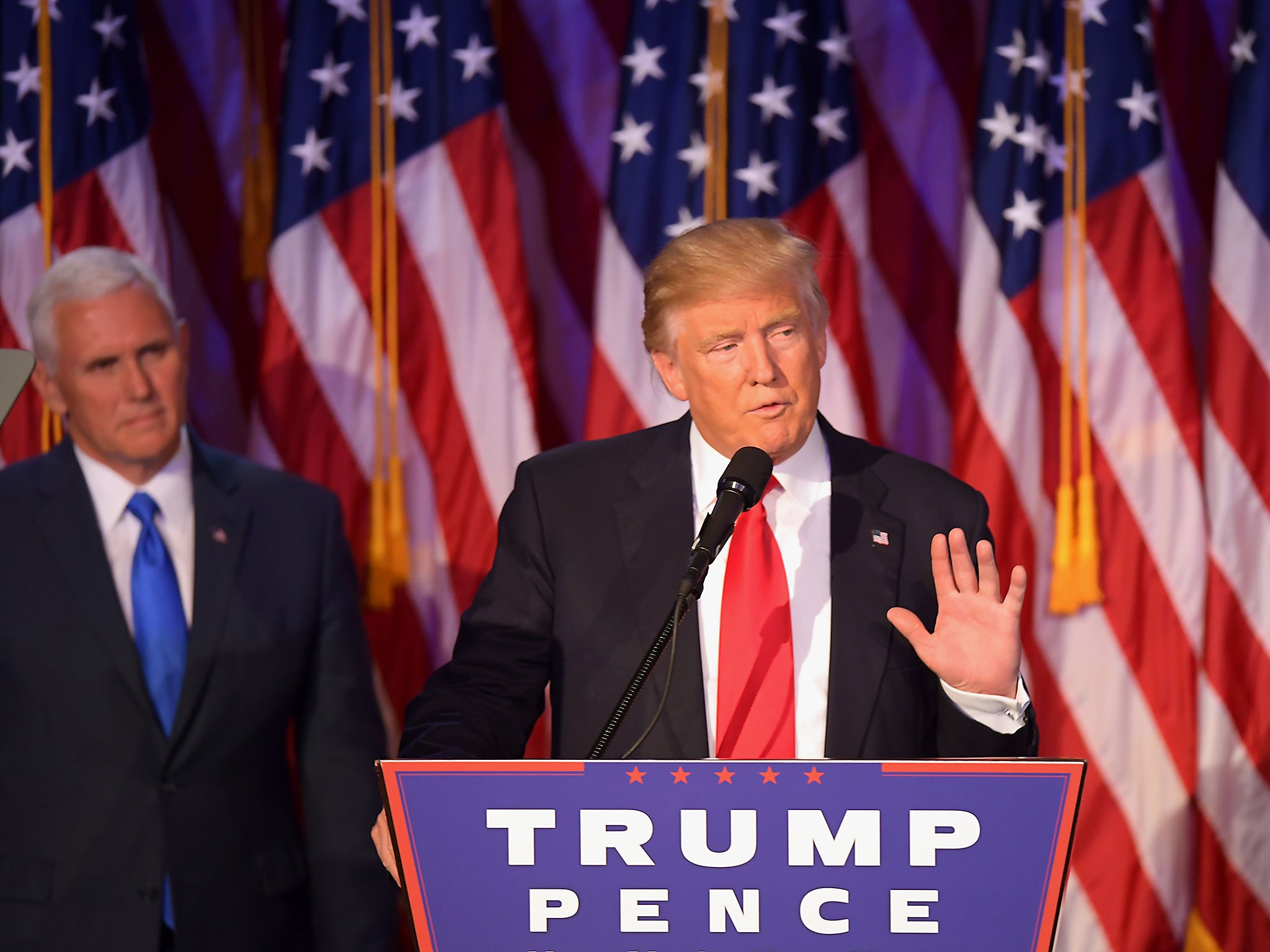The Independent's journalism is supported by our readers. When you purchase through links on our site, we may earn commission.
Why did Trump win – 'Whitelash' or economic frustration?
Was Trump’s victory more attributable to his mobilisation of white racism? Or were economic factors, which made large groups of people who would otherwise have voted Democrat go over to Trump, crucial?


What did they mean by that? Liberals were compelled to ask the question about British voters after the Brexit shock. And we’re forced to ask it again now in the wake of the massive support from Americans – far bigger and broader than many thought possible – for an overtly racist, misogynist and lying bigot called Donald Trump.
“East is East and West is West and never the twain shall meet,” said Kipling. A similar continental-sized polarisation of views has emerged among liberals on the support for Trump.
Some insist that the Trump phenomenon is self-evidently an economic phenomenon; partly a revolt against decades of stagnant or pitifully low income growth; partly delayed blowback from the 2008 global financial crisis. “The left-behind striking back” is how Martin Sandbu of the Financial Times describes the Trump victory.
But other liberals reject this entire line of thinking. “I don’t want to hear a word about economics,” says the historian Simon Schama, pointing, like many other commentators and analysts, to survey data showing that Trump voters as a group have relatively high average incomes and that they are often concentrated in areas which have felt no real negative impact from globalisation. To suggest that a vote for Trump was a cry of the economically dispossessed is to excuse the racism and misogyny that motivated those who voted for the man, it is argued, not to mention being an insult to the majority of poor people who eschewed Trump’s demagoguery.
Both sides in this liberal debate fall into a similar trap as we saw in the Brexit debate of cleaving to mono-causal explanations. Different people can cast the same vote for many different reasons. Several factors can be simultaneously at work. Those who have been under the economic cosh might have voted Trump as a kind of desperate protest. And people who are economically comfortable and bigoted might have voted Trump because they genuinely liked what they heard. The two can also interact – people can be more likely to fall into angry nativism when they feel economically insecure.
Another factor that deserves more attention is reference point psychology. Looking at people’s income levels is too crude. Psychological research (and indeed basic intuition) suggests that what often matters is not just the level of people’s income but the level relative to where they expected to be. So a recent immigrant from a poor country may be more content with a given wage than someone who has been on that same wage for a decade and who hoped for more for themselves and their family. Racial resentment can feed off this sense of economic frustration. If people feel their standard of living has been stagnant while other ethnic groups are seizing opportunities to advance, they might be attracted to Trump for both economic and bigoted reasons.
There is a bigger point. Dramatic laments from liberals that “America elected a bigot” or “Britain has turned its back on Europe” in relation to Brexit, though understandable shorthand, are misleading and perhaps counterproductive. First, they are not literally true. A large proportion of the population voted for those things. And a large proportion did not. Don’t forget that Hillary Clinton won the popular vote handily and that 48 per cent of the UK electorate voted to Remain. Such liberal laments are actually the flipside of the rhetoric of the right-wing press which insists that a hard Brexit now represents “the will of the people” or those on the conservative right in America who seem to see Trump as enjoying some kind of overwhelming mandate to tear up decades of liberal social policies.
Second, such histrionic rhetoric obscures the fact that democratic elections are the battle to attract the marginal voter. A considerable proportion of the public hold illiberal views – and they will always probably be attracted for parties or candidates that pander to those sentiments. Similarly, a large share hold liberal views – and they will always vote accordingly. The question is: how or why do these rival blocs grow large enough relative to each other to win elections?
To the extent that some voters may have been attracted to Trump’s message because of economic pain, economics is significant. And the exit polls suggest he did get a considerably larger share of the vote of Americans on low incomes than Mitt Romney did for the Republican party in the 2012 election.
That is not to claim all Trump voters were victims of globalisation – or that his racism and even misogyny were not important mobilising factors for his support. But it’s a mistake to discount economic factors entirely. Different economic policies – more redistribution, more resources to hollowed out communities – might have made the siren song of Trump’s demagoguery less attractive to many people. Not to all people, but maybe to enough to make a difference to the election result.
The debate liberals should really be having is over what was the arithmetically crucial factor in delivering the result. Was Trump’s victory more attributable to his mobilisation of white racism, a “whitelash” as some have termed it? Or were economic factors, which made large groups of people who would otherwise have voted Democrat go over to Trump, crucial?
Hard to answer. There are several moving parts in the equation – and they are immensely hard to disentangle. But the first task for liberals in explaining the Trump catastrophe is to think about the question in the right way.
Join our commenting forum
Join thought-provoking conversations, follow other Independent readers and see their replies
0Comments